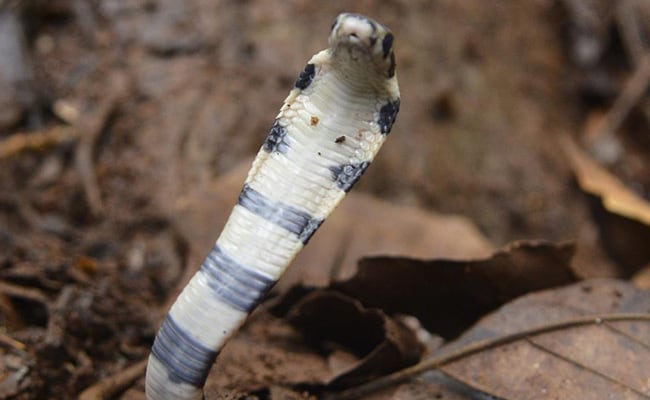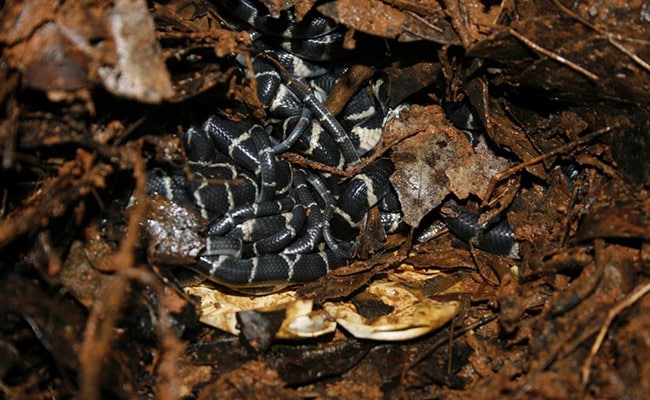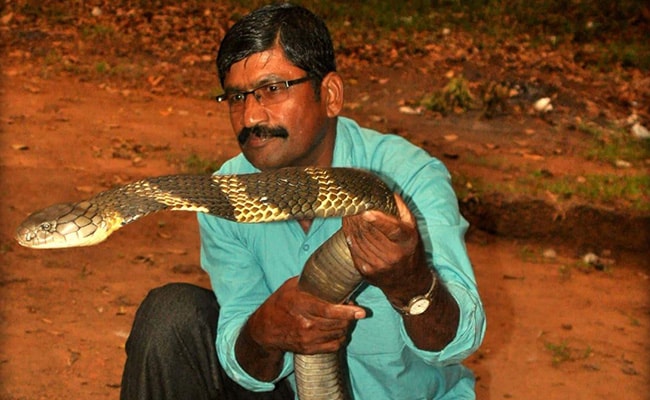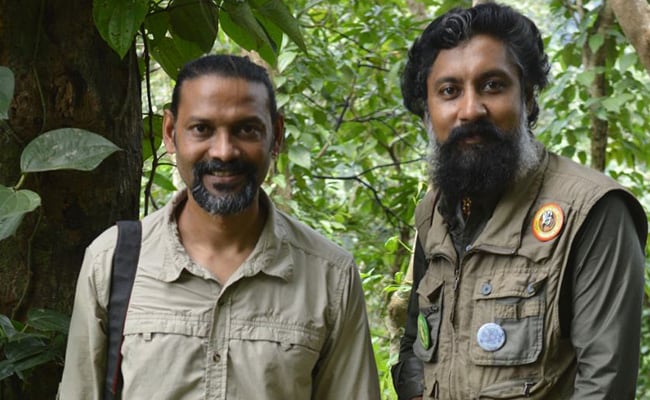
King cobras are considered among the world's most venomous snakes (Kalinga Centre for Rainforest Ecology)
In a hilly village in Kerala's Kannur, three passionate conservationists stood guard over king cobra eggs for over a hundred days, till they hatched. The men managed to get locals involved as well, convincing them not to destroy the numerous eggs laid by a king cobra sometime in May.
Chandran MP, a member of the Forest Department's Rapid Response Force, got a panic call on April 22 after a cobra was spotted in Kottiyoor.
Vijay Neelakantan and Gowri Shankara were with Mr Chandran and eventually spotted the king cobra's nest and eggs. Experts say this was likely the mother king cobra's first nesting, and she may have abandoned the eggs out of fear, after being spotted.
"There was no way we would agreed to have the eggs destroyed," Mr Neelakantan categorically tells NDTV.

 And from there started their attempts at engaging with concerned locals, who were worried about the the possibility of several hatchlings emerging out of the eggs. King cobras are considered among the most venomous snakes in the world.
And from there started their attempts at engaging with concerned locals, who were worried about the the possibility of several hatchlings emerging out of the eggs. King cobras are considered among the most venomous snakes in the world.
It was tough convincing locals to let the eggs be, admits Mr Neelakantan. "We showed them several presentations and dealt with their fears logically and scientifically," he explains.

 Despite living nearly 90 kilometres away from the location of the king cobra's nest, the conservationists would travel every other day to check on the eggs. King cobra eggs usually take approximately 80 to 105 days to hatch.
Despite living nearly 90 kilometres away from the location of the king cobra's nest, the conservationists would travel every other day to check on the eggs. King cobra eggs usually take approximately 80 to 105 days to hatch.
After 72 days, they started a round-the-clock vigil, till they saw the king cobra hatchlings emerge, nearly 30 days later.
While they refuse to give out the exact number of hatchlings, saying they want to avoid panic among locals, Mr Neelakantan assures NDTV the hatchlings were released deep into the forest.
"The whole process of seeing the eggs hatch... and people's attitude change...was a reward we would cherish," says Mr Neelakantan.

 "The plantation owner, Mr Mathews, who had made that first panic call on seeing a cobra, told us that for the first time he was not scared of snakes at his plantation, despite the king cobra hatchlings," says Mr Neelakantan. "That's what we want. We want many more Mathews."
"The plantation owner, Mr Mathews, who had made that first panic call on seeing a cobra, told us that for the first time he was not scared of snakes at his plantation, despite the king cobra hatchlings," says Mr Neelakantan. "That's what we want. We want many more Mathews."
Chandran MP, a member of the Forest Department's Rapid Response Force, got a panic call on April 22 after a cobra was spotted in Kottiyoor.
Vijay Neelakantan and Gowri Shankara were with Mr Chandran and eventually spotted the king cobra's nest and eggs. Experts say this was likely the mother king cobra's first nesting, and she may have abandoned the eggs out of fear, after being spotted.
"There was no way we would agreed to have the eggs destroyed," Mr Neelakantan categorically tells NDTV.

Photo Credit: Kalinga Centre for Rainforest Ecology

Photo Credit: Kalinga Centre for Rainforest Ecology
It was tough convincing locals to let the eggs be, admits Mr Neelakantan. "We showed them several presentations and dealt with their fears logically and scientifically," he explains.

Photo Credit: Kalinga Centre for Rainforest Ecology

Photo Credit: Kalinga Centre for Rainforest Ecology
After 72 days, they started a round-the-clock vigil, till they saw the king cobra hatchlings emerge, nearly 30 days later.
While they refuse to give out the exact number of hatchlings, saying they want to avoid panic among locals, Mr Neelakantan assures NDTV the hatchlings were released deep into the forest.
"The whole process of seeing the eggs hatch... and people's attitude change...was a reward we would cherish," says Mr Neelakantan.

Photo Credit: Kalinga Centre for Rainforest Ecology

Photo Credit: Kalinga Centre for Rainforest Ecology
Track Latest News Live on NDTV.com and get news updates from India and around the world

